https://www.cdc.gov/mmwr/volumes/69/wr/mm6930e1.htm">https://www.cdc.gov/mmwr/volu...
Of relevance to risk assessment of re-opening uni halls of residence & resuming in-person teaching: "convalescence can be prolonged even in young adults without chronic medical conditions, potentially leading to prolonged absence from work, studies, or other activities." 2/
Odds of not returning to normal health within 2-3 weeks are higher if older https://abs.twimg.com/emoji/v2/... draggable="false" alt="👇" title="Rückhand Zeigefinger nach unten" aria-label="Emoji: Rückhand Zeigefinger nach unten">. 3/
https://abs.twimg.com/emoji/v2/... draggable="false" alt="👇" title="Rückhand Zeigefinger nach unten" aria-label="Emoji: Rückhand Zeigefinger nach unten">. 3/
But the difference in odds between young & old of non-swift recovery https://abs.twimg.com/emoji/v2/... draggable="false" alt="👆" title="Rückhand Zeigefinger nach oben" aria-label="Emoji: Rückhand Zeigefinger nach oben">is not nearly as great as the difference in odds of death from Covid
https://abs.twimg.com/emoji/v2/... draggable="false" alt="👆" title="Rückhand Zeigefinger nach oben" aria-label="Emoji: Rückhand Zeigefinger nach oben">is not nearly as great as the difference in odds of death from Covid https://abs.twimg.com/emoji/v2/... draggable="false" alt="👇" title="Rückhand Zeigefinger nach unten" aria-label="Emoji: Rückhand Zeigefinger nach unten">. Couldn& #39;t be as great, given how *high* the odds for the young are *in absolute terms* of non-swift recovery. 4/ https://medium.com/@mikeotsuka/healthy-workers-as-young-as-45-at-greater-risk-from-covid-19-than-clinically-vulnerable-workers-a1f610062af2">https://medium.com/@mikeotsu...
https://abs.twimg.com/emoji/v2/... draggable="false" alt="👇" title="Rückhand Zeigefinger nach unten" aria-label="Emoji: Rückhand Zeigefinger nach unten">. Couldn& #39;t be as great, given how *high* the odds for the young are *in absolute terms* of non-swift recovery. 4/ https://medium.com/@mikeotsuka/healthy-workers-as-young-as-45-at-greater-risk-from-covid-19-than-clinically-vulnerable-workers-a1f610062af2">https://medium.com/@mikeotsu...
In the overall sample, whose median age was 42.5 years, 35% had not returned to their usual state of health when interviewed 2–3 weeks after testing. This includes those with & without pre-existing health conditions. 5/
Breakdown by age, including those with as well as without pre-existing health conditions: 26% 18–34 yrs, 32% 35–49 yrs, & 47% aged ≥50 "reported not having returned to their usual state of health (p = 0.010) within 14–21 days after receiving a positive test result". 6/
Much worse than the flu, where, among working adults (mean age 44), less than 10% of "outpatients with influenza [fail to] recover within approximately 2 weeks of having a positive test result". CDC cites this https://abs.twimg.com/emoji/v2/... draggable="false" alt="👇" title="Rückhand Zeigefinger nach unten" aria-label="Emoji: Rückhand Zeigefinger nach unten">re influenza. 7/ https://pubmed.ncbi.nlm.nih.gov/26565004/ ">https://pubmed.ncbi.nlm.nih.gov/26565004/...
https://abs.twimg.com/emoji/v2/... draggable="false" alt="👇" title="Rückhand Zeigefinger nach unten" aria-label="Emoji: Rückhand Zeigefinger nach unten">re influenza. 7/ https://pubmed.ncbi.nlm.nih.gov/26565004/ ">https://pubmed.ncbi.nlm.nih.gov/26565004/...
This study is significant insofar as it& #39;s one of only a few, thus far, to quantify risks of serious illness short of death among a random sample of those confirmed to have Covid-19. 8/
The study is especially valuable insofar as it breaks risks down by age groups, while also adjusting for other factors such as pre-existing health conditions. See the full list of adjusted odds ratios which the study calculates (including for gender & ethnicity) https://abs.twimg.com/emoji/v2/... draggable="false" alt="👇" title="Rückhand Zeigefinger nach unten" aria-label="Emoji: Rückhand Zeigefinger nach unten">. 9/
https://abs.twimg.com/emoji/v2/... draggable="false" alt="👇" title="Rückhand Zeigefinger nach unten" aria-label="Emoji: Rückhand Zeigefinger nach unten">. 9/
NB: In this study, 94% were experiencing at least one symptom at time of testing. Given the high proportion, especially among the young, of those with Covid-19 who remain asymptomatic, the study therefore doesn& #39;t provide odds of prolonged illness if infected. 10/
The following remains the case: even if you& #39;re young & healthy, you want to take precautions to ensure that you don& #39;t wake up one morning with symptoms that tests confirm to be caused by Covid-19. 11/
This is because your odds, in this case, of prolonged illness beyond 2-3 weeks are nearly one in five. Moreover, such illness develops in a number of cases into months of debility & suffering https://abs.twimg.com/emoji/v2/... draggable="false" alt="👇" title="Rückhand Zeigefinger nach unten" aria-label="Emoji: Rückhand Zeigefinger nach unten">. 12/ https://twitter.com/MikeOtsuka/status/1287835804509904897">https://twitter.com/MikeOtsuk...
https://abs.twimg.com/emoji/v2/... draggable="false" alt="👇" title="Rückhand Zeigefinger nach unten" aria-label="Emoji: Rückhand Zeigefinger nach unten">. 12/ https://twitter.com/MikeOtsuka/status/1287835804509904897">https://twitter.com/MikeOtsuk...
Yale Immunobiology Prof Akiko "Iwasaki is especially struck by the number of young, healthy, active people…who fall into the long-hauler category" of those afflicted with "dozens of symptoms" for months, "such as fatigue, joint pain, and fever". /13 https://www.sciencemag.org/news/2020/07/brain-fog-heart-damage-covid-19-s-lingering-problems-alarm-scientists">https://www.sciencemag.org/news/2020...
The risks, of course, are greater for those older & in less good health. But they remain real for young & healthy adults, ages 18-34. University leaders will need to update their plans for re-opening in the light of the information of risks short of death which is emerging. 14/14
See also https://abs.twimg.com/emoji/v2/... draggable="false" alt="👀" title="Augen" aria-label="Emoji: Augen">
https://abs.twimg.com/emoji/v2/... draggable="false" alt="👀" title="Augen" aria-label="Emoji: Augen"> https://abs.twimg.com/emoji/v2/... draggable="false" alt="👇" title="Rückhand Zeigefinger nach unten" aria-label="Emoji: Rückhand Zeigefinger nach unten">. https://twitter.com/CT_Bergstrom/status/1287994291902545920">https://twitter.com/CT_Bergst...
https://abs.twimg.com/emoji/v2/... draggable="false" alt="👇" title="Rückhand Zeigefinger nach unten" aria-label="Emoji: Rückhand Zeigefinger nach unten">. https://twitter.com/CT_Bergstrom/status/1287994291902545920">https://twitter.com/CT_Bergst...
A piece https://abs.twimg.com/emoji/v2/... draggable="false" alt="👇" title="Rückhand Zeigefinger nach unten" aria-label="Emoji: Rückhand Zeigefinger nach unten">on #LongCovid by @GYamey, a physician & professor of global health and public policy at @DukeU & Sharon Taylor, a Consultant Child & Adolescent Psychiatrist at @imperialcollege. 1/ https://time.com/5878448/longterm-covid19-recognition-research/">https://time.com/5878448/l...
https://abs.twimg.com/emoji/v2/... draggable="false" alt="👇" title="Rückhand Zeigefinger nach unten" aria-label="Emoji: Rückhand Zeigefinger nach unten">on #LongCovid by @GYamey, a physician & professor of global health and public policy at @DukeU & Sharon Taylor, a Consultant Child & Adolescent Psychiatrist at @imperialcollege. 1/ https://time.com/5878448/longterm-covid19-recognition-research/">https://time.com/5878448/l...
@GYamey & Sharon Taylor note that #LongCovid challenges the assumption, on which re-opening many universities is based, that "it& #39;s safe to let young adults get infected" https://abs.twimg.com/emoji/v2/... draggable="false" alt="👇" title="Rückhand Zeigefinger nach unten" aria-label="Emoji: Rückhand Zeigefinger nach unten">. 2/
https://abs.twimg.com/emoji/v2/... draggable="false" alt="👇" title="Rückhand Zeigefinger nach unten" aria-label="Emoji: Rückhand Zeigefinger nach unten">. 2/
Those universities, for example, which aren& #39;t providing for the frequent testing of all students  https://abs.twimg.com/emoji/v2/... draggable="false" alt="👇" title="Rückhand Zeigefinger nach unten" aria-label="Emoji: Rückhand Zeigefinger nach unten">, & which aren& #39;t eliminating widespread sharing of bedrooms & bathrooms in their halls of residence, must be assuming such safety of infection. 3/3 https://twitter.com/MikeOtsuka/status/1289243511414558721">https://twitter.com/MikeOtsuk...
https://abs.twimg.com/emoji/v2/... draggable="false" alt="👇" title="Rückhand Zeigefinger nach unten" aria-label="Emoji: Rückhand Zeigefinger nach unten">, & which aren& #39;t eliminating widespread sharing of bedrooms & bathrooms in their halls of residence, must be assuming such safety of infection. 3/3 https://twitter.com/MikeOtsuka/status/1289243511414558721">https://twitter.com/MikeOtsuk...
Study involving cardiac MRI scans reveals heart damage among "relatively young, healthy patients" with Covid-19, many who "had just returned from ski vacations". 1/
https://www.statnews.com/2020/07/27/covid19-concerns-about-lasting-heart-damage/">https://www.statnews.com/2020/07/2...
https://www.statnews.com/2020/07/27/covid19-concerns-about-lasting-heart-damage/">https://www.statnews.com/2020/07/2...
Concerns raised https://abs.twimg.com/emoji/v2/... draggable="false" alt="👇" title="Rückhand Zeigefinger nach unten" aria-label="Emoji: Rückhand Zeigefinger nach unten">"about relatively young people losing their cardiac health reserves, which typically decrease with age and can set the stage for heart failure". 2/
https://abs.twimg.com/emoji/v2/... draggable="false" alt="👇" title="Rückhand Zeigefinger nach unten" aria-label="Emoji: Rückhand Zeigefinger nach unten">"about relatively young people losing their cardiac health reserves, which typically decrease with age and can set the stage for heart failure". 2/
This tweet https://abs.twimg.com/emoji/v2/... draggable="false" alt="👇" title="Rückhand Zeigefinger nach unten" aria-label="Emoji: Rückhand Zeigefinger nach unten">, which I quoted above
https://abs.twimg.com/emoji/v2/... draggable="false" alt="👇" title="Rückhand Zeigefinger nach unten" aria-label="Emoji: Rückhand Zeigefinger nach unten">, which I quoted above https://abs.twimg.com/emoji/v2/... draggable="false" alt="👆" title="Rückhand Zeigefinger nach oben" aria-label="Emoji: Rückhand Zeigefinger nach oben">, also comments on the MRI study. 3/3 https://twitter.com/CT_Bergstrom/status/1287994291902545920">https://twitter.com/CT_Bergst...
https://abs.twimg.com/emoji/v2/... draggable="false" alt="👆" title="Rückhand Zeigefinger nach oben" aria-label="Emoji: Rückhand Zeigefinger nach oben">, also comments on the MRI study. 3/3 https://twitter.com/CT_Bergstrom/status/1287994291902545920">https://twitter.com/CT_Bergst...

 Read on Twitter
Read on Twitter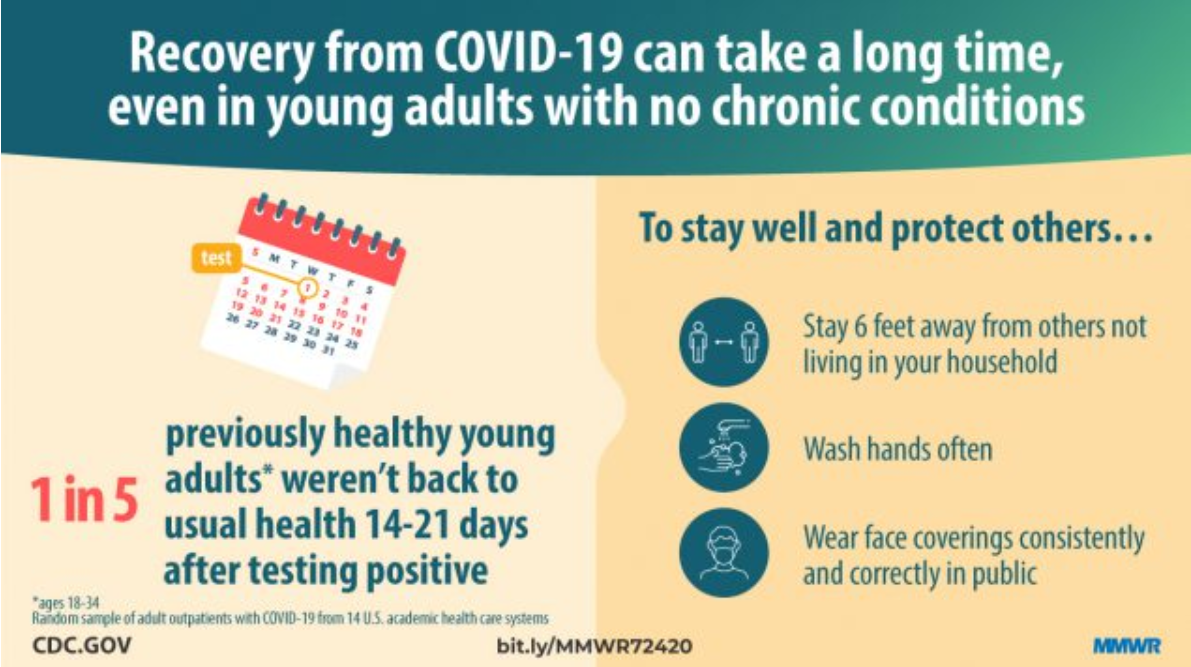 1 in 5 ages 18-34 with no underlying health conditions had not returned to usual health 2-3 weeks after testing positive for Covid-19. CDC random sample of mainly young adults who had tested positive across 14 US academic health care systems. 1/ https://www.cdc.gov/mmwr/volu..." title="https://abs.twimg.com/emoji/v2/... draggable="false" alt="🚨" title="Polizeiautos mit drehendem Licht" aria-label="Emoji: Polizeiautos mit drehendem Licht">1 in 5 ages 18-34 with no underlying health conditions had not returned to usual health 2-3 weeks after testing positive for Covid-19. CDC random sample of mainly young adults who had tested positive across 14 US academic health care systems. 1/ https://www.cdc.gov/mmwr/volu..." class="img-responsive" style="max-width:100%;"/>
1 in 5 ages 18-34 with no underlying health conditions had not returned to usual health 2-3 weeks after testing positive for Covid-19. CDC random sample of mainly young adults who had tested positive across 14 US academic health care systems. 1/ https://www.cdc.gov/mmwr/volu..." title="https://abs.twimg.com/emoji/v2/... draggable="false" alt="🚨" title="Polizeiautos mit drehendem Licht" aria-label="Emoji: Polizeiautos mit drehendem Licht">1 in 5 ages 18-34 with no underlying health conditions had not returned to usual health 2-3 weeks after testing positive for Covid-19. CDC random sample of mainly young adults who had tested positive across 14 US academic health care systems. 1/ https://www.cdc.gov/mmwr/volu..." class="img-responsive" style="max-width:100%;"/>
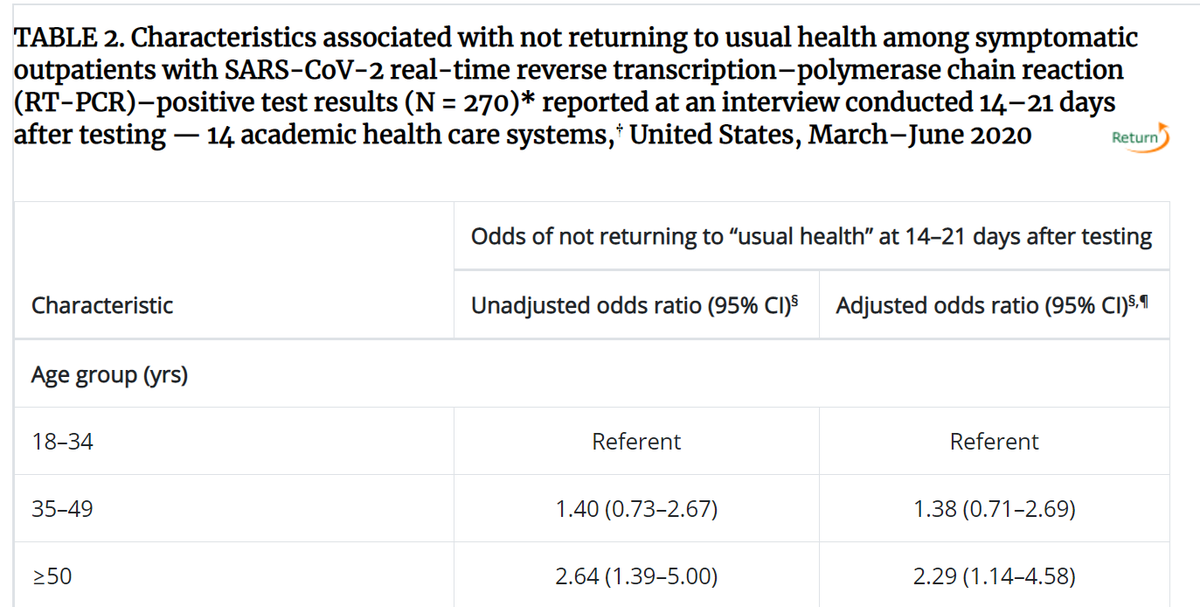 . 3/" title="Odds of not returning to normal health within 2-3 weeks are higher if olderhttps://abs.twimg.com/emoji/v2/... draggable="false" alt="👇" title="Rückhand Zeigefinger nach unten" aria-label="Emoji: Rückhand Zeigefinger nach unten">. 3/" class="img-responsive" style="max-width:100%;"/>
. 3/" title="Odds of not returning to normal health within 2-3 weeks are higher if olderhttps://abs.twimg.com/emoji/v2/... draggable="false" alt="👇" title="Rückhand Zeigefinger nach unten" aria-label="Emoji: Rückhand Zeigefinger nach unten">. 3/" class="img-responsive" style="max-width:100%;"/>
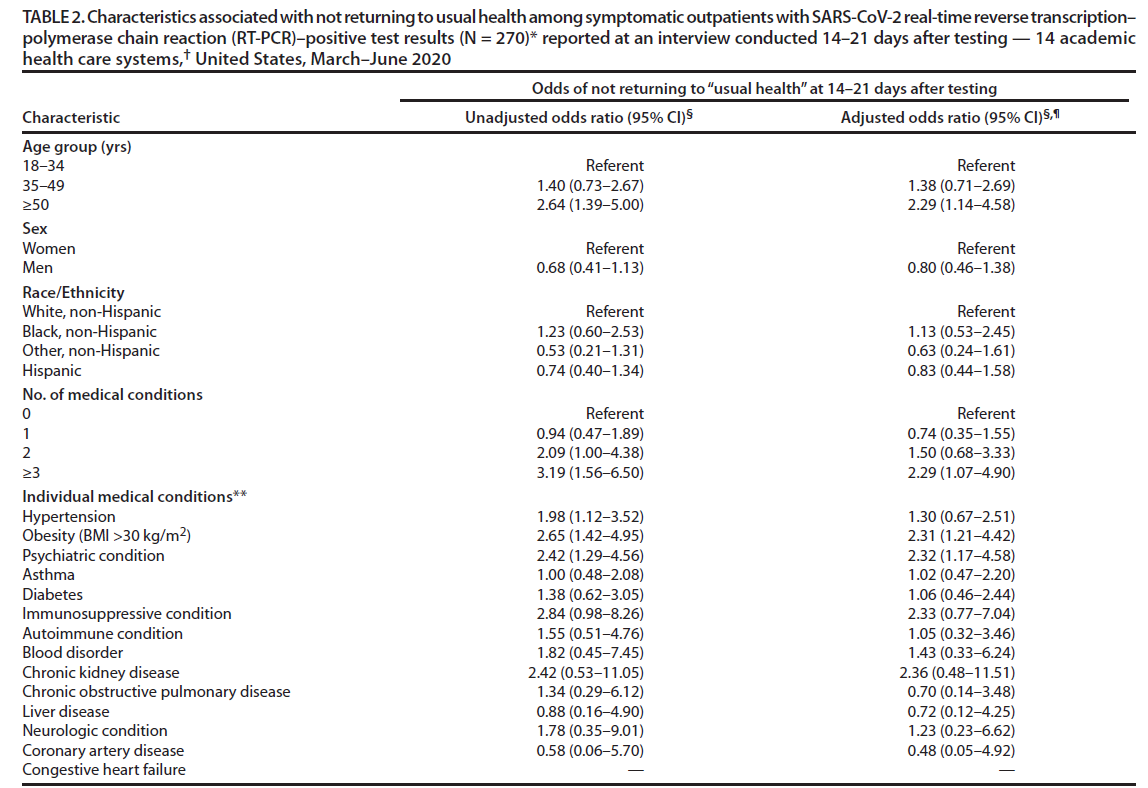 . 9/" title="The study is especially valuable insofar as it breaks risks down by age groups, while also adjusting for other factors such as pre-existing health conditions. See the full list of adjusted odds ratios which the study calculates (including for gender & ethnicity)https://abs.twimg.com/emoji/v2/... draggable="false" alt="👇" title="Rückhand Zeigefinger nach unten" aria-label="Emoji: Rückhand Zeigefinger nach unten">. 9/" class="img-responsive" style="max-width:100%;"/>
. 9/" title="The study is especially valuable insofar as it breaks risks down by age groups, while also adjusting for other factors such as pre-existing health conditions. See the full list of adjusted odds ratios which the study calculates (including for gender & ethnicity)https://abs.twimg.com/emoji/v2/... draggable="false" alt="👇" title="Rückhand Zeigefinger nach unten" aria-label="Emoji: Rückhand Zeigefinger nach unten">. 9/" class="img-responsive" style="max-width:100%;"/>
 . 2/" title=" @GYamey & Sharon Taylor note that #LongCovid challenges the assumption, on which re-opening many universities is based, that "it& #39;s safe to let young adults get infected"https://abs.twimg.com/emoji/v2/... draggable="false" alt="👇" title="Rückhand Zeigefinger nach unten" aria-label="Emoji: Rückhand Zeigefinger nach unten">. 2/" class="img-responsive" style="max-width:100%;"/>
. 2/" title=" @GYamey & Sharon Taylor note that #LongCovid challenges the assumption, on which re-opening many universities is based, that "it& #39;s safe to let young adults get infected"https://abs.twimg.com/emoji/v2/... draggable="false" alt="👇" title="Rückhand Zeigefinger nach unten" aria-label="Emoji: Rückhand Zeigefinger nach unten">. 2/" class="img-responsive" style="max-width:100%;"/>
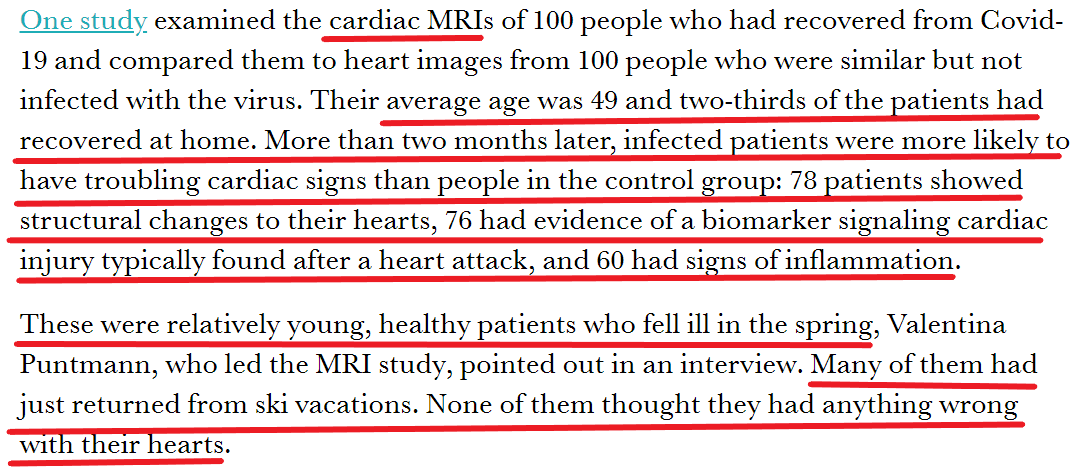
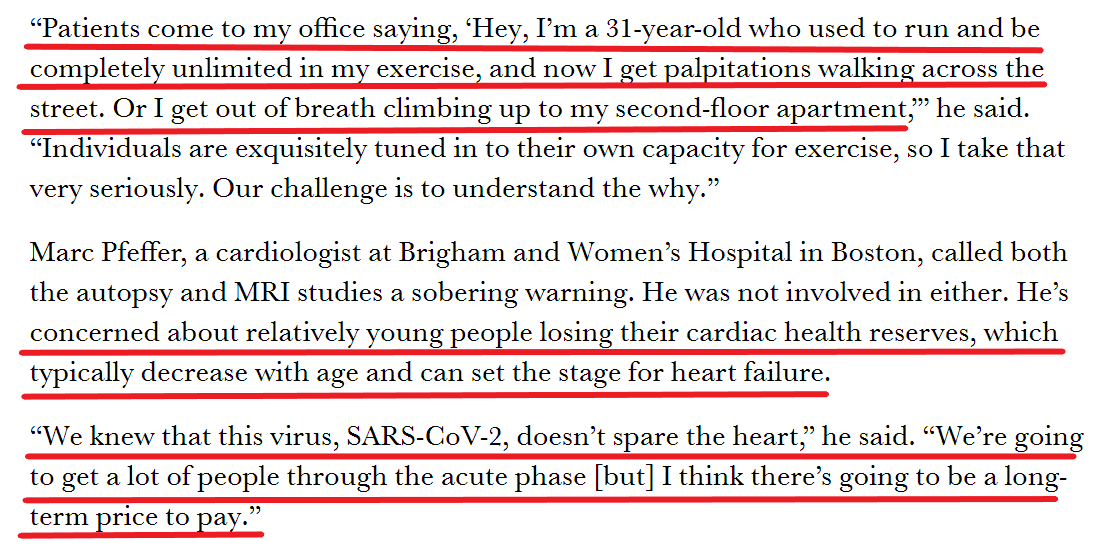 "about relatively young people losing their cardiac health reserves, which typically decrease with age and can set the stage for heart failure". 2/" title="Concerns raisedhttps://abs.twimg.com/emoji/v2/... draggable="false" alt="👇" title="Rückhand Zeigefinger nach unten" aria-label="Emoji: Rückhand Zeigefinger nach unten">"about relatively young people losing their cardiac health reserves, which typically decrease with age and can set the stage for heart failure". 2/" class="img-responsive" style="max-width:100%;"/>
"about relatively young people losing their cardiac health reserves, which typically decrease with age and can set the stage for heart failure". 2/" title="Concerns raisedhttps://abs.twimg.com/emoji/v2/... draggable="false" alt="👇" title="Rückhand Zeigefinger nach unten" aria-label="Emoji: Rückhand Zeigefinger nach unten">"about relatively young people losing their cardiac health reserves, which typically decrease with age and can set the stage for heart failure". 2/" class="img-responsive" style="max-width:100%;"/>


